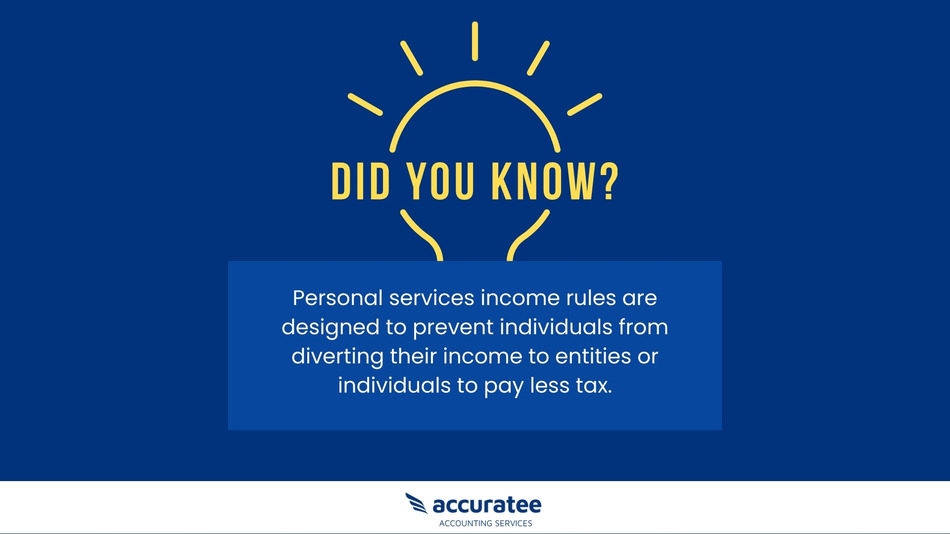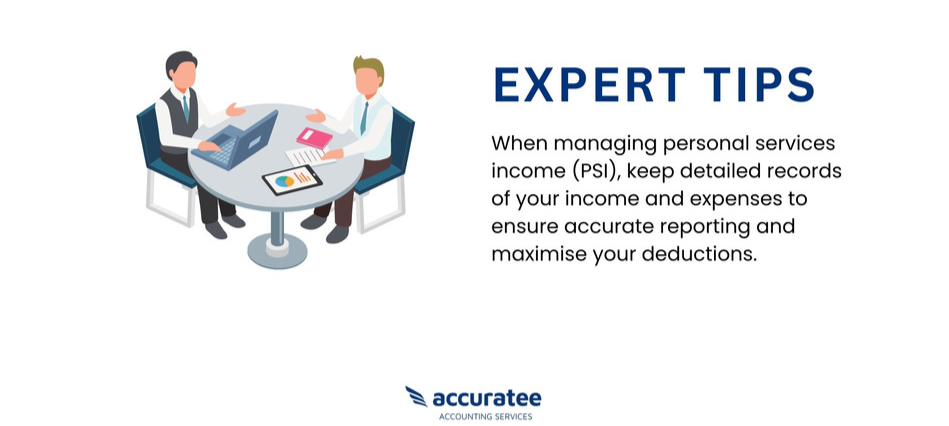Demystifying personal services income: Key to your financial success
Introduction:
At CleanSlate, we understand the unique challenges faced by businesses like yours when it comes to managing financial records and navigating tax regulations.
As a leading outsourcing accounting and bookkeeping services provider for small business in Australia, we are here to guide you through the intricacies of personal services income (PSI) and help you make informed decisions that will drive your business operations forward.
In this blog, we delve deep into the realm of personal services income regulations, shedding light on the rules that govern how your income is taxed and the deductions you can claim.
But we go beyond the technicalities. We provide practical strategies to avoid common pitfalls and ensure compliance, empowering you to minimise tax liabilities and maximise deductions.
Key takeaways
Understand the criteria for personal services income (PSI)
Maintain accurate and organised income statement, expenses and deductions related to PSI
Claim only legitimate deductions allowed under PSI rules
Comply with tax reporting requirements concerning PSI
Utilise advanced digital tools and best practices for efficient record-keeping and compliance
What is personal services income?
Personal services income (PSI) is the income primarily from your personal skills or efforts as an individual. If more than half of the income received for a contract or invoice is a result of your own labour, expertise, or skills rather than derived from assets, sale of goods, or a business structure, then it is classified as PSI.
Personal services income can be earned across various industries, trades, or professions. The purpose of the PSI rules is to prevent the diversion or splitting of income with others or entities as a means to minimise tax obligations. These rules ensure that individuals accurately report and pay taxes on the income they generate from their personal services, maintaining fairness and integrity within the tax system.
To better understand, let's explore a few personal services examples of situations where it applies.
Consider a graphic designer who provides design services as a sole trader to various clients. The income earned from the design work would be classified as PSI. Similarly, a self-employed consultant offering expertise in their field and generating income through consulting services would also fall under the PSI category.
Understanding PSI and its unique characteristics is essential for businesses and individuals to comply with tax regulations and make informed financial decisions.
What is the significance of personal services income?
It is common for individuals to establish a business entity, such as a trust, partnership, or more commonly, a company, to manage their professional affairs.
This allows for various benefits, including the advantage of a lower tax rate of 26% for small companies compared to the higher personal tax rate of 45%. Additionally, companies have the opportunity to claim a broader range of tax deductions and have flexibility in retaining profits within the business. This approach can be an effective strategy for small businesses to protect their overall profitability.
Consequently, the Australian Taxation Office (ATO) has implemented specific income tax rules and regulations to ensure that individuals cannot exploit the system by manipulating their personal income through such entities to reduce their tax liability and ensure proper taxation compliance.

Which source of income is not considered personal services income?
Income is not considered personal services income in the following cases:
-
Salary and wage earners:
Individuals who are employees receiving only salaries and wages are not affected by the PSI rules.
-
Supplying or selling goods:
If revenue is primarily generated from supplying or selling goods rather than personal efforts or skills, it is not classified as personal services income. However, the use of materials as a minor part of the services provided does not qualify as supplying or selling goods.
-
Example:
Lisa is a jewellery maker who operates as a sole trader. She creates unique handmade bracelets, necklaces, and earrings, which she sells at local markets and through her online store. The money she receives for her crafts is primarily for the sale of physical goods sold rather than solely based on her personal efforts or skills. Therefore, the revenue derived from the sales is not classified as personal services income.
-
Supplying or using an income-producing asset:
If revenue is mainly generated by an asset rather than an individual's efforts or skills, it is not PSI. The presence of an essential asset, specified in a contract that represents more than 50% of the contract price indicates income not attributable to personal efforts or skills.
-
Example:
Alex is a construction equipment owner who operates BuildRite Equipment Rentals. He owns a fleet of heavy machinery, including excavators, bulldozers, and cranes. Alex receives contracts from construction companies that require his equipment for various projects.
For instance, a construction company named MegaBuilders contracts BuildRite Equipment Rentals to provide an excavator for a road construction project. The agreement states that Alex will supply the excavator along with a qualified operator for a specified duration.
In this case, the revenue generated by BuildRite Equipment Rentals is not classified as personal services income. The main source of income is the supply and use of the excavator, which is an income-producing asset, rather than being solely based on Alex's personal efforts or skills.
-
Income from a business structure:
Income generated from the business structure of an entity, rather than personal services, is not considered PSI. Factors such as reliance on personal skills, the number of employees, presence of goodwill, use of income-producing assets, nature of activities, and size of the operation determine if revenue is generated from a business structure.
-
Example:
Fred owns Tech Solutions, an IT consulting business that offers various services such as software development, system integration, and technical support. With a team of skilled IT professionals, Tech Solutions has built a strong reputation and established long-term relationships with corporate clients.
The company's revenue is not classified as personal services income because it is generated through the collective expertise of the team and the business structure, rather than being solely reliant on Fred’s individual efforts.
How do the personal services income rules and regulations work?
Determining if you have received PSI and if you are running a PSB involves a series of steps outlined by the Australian Taxation Office (ATO). These steps must be followed in the correct sequence.
-
Step 1: Have you received PSI?
If over 50% of the income you received for a contract is based on your skills, labour, or expertise, then you have received PSI.
If you answered yes to step 1, proceed to the following tests.
-
Step 2: The results test
To be eligible and exempt from personal services income rules, you must answer yes to the following questions for at least 75% of your personal services income:
- Do you only receive money upon completion of your work or after producing the contracted result?
- Are you responsible for providing the necessary equipment or tools for your work?
- Are you liable for the costs of any defects and responsible for rectifying mistakes or defects?
If you meet the criteria for Step 2, the PSI rules do not apply. If you did not answer yes to these questions, proceed to Step 3.
-
Step 3: The 80% rule
If 80% or more of your PSI comes from the same client or their associates, then the PSI rules will apply to you, and you have failed this test. If you need clarification on this, seek assistance from a professional tax services provider, like CleanSlate.
If each of your clients provides less than 80% of your PSI, proceed to Step 4.
-
Step 4: The remaining tests
The final tests include the unrelated clients test, the business premises test, and the employment test. If you pass any of these tests, the PSI rules do not apply.
-
The unrelated clients test:
Your business satisfies this test if it provides services to two or more clients not associated with each other.
-
The employment test:
If your employees or partners complete 20% (by market value) of the work you are being paid for, you pass this test. Having an apprentice for at least six months a year would fulfil this requirement.
-
The business premises test:
Your business passes this test if your business premises are used solely for business operations and are not connected to your home in any way throughout the year. The premises should not be shared with another business.
You can pass more than one test, but passing just one is sufficient to pass the PSI income tests. Failing to meet these criteria renders you ineligible to claim any deductions.
Personal services income rules are quite intricate and hard to follow. It is recommended to consult with a tax professional or refer to the personal services income ATO guidelines for detailed guidance tailored to your situation.
-
Expert Bookkeeping at Your Fingertips!
What to do if personal services income applies?
If the rules do apply, it will impact the tax deductions you can claim for personal services income and how you report it.
It is important to note that all other revenue you earn follows normal tax rules.
When claiming personal services income deductions, you can include expenses related to:
- Advertising to gain work
- Registration fees
- Account-keeping fees
- Some insurance costs
- Payments to employees other than associate
- Part of home office expenses (electricity, internet, heating)
When the PSI rules apply, there are certain deductions that you cannot claim against that taxable income. These include expenses such as:
- Mortgage interest, rent, or land tax for your home or your associate's home
- Payments made to your spouse or other associates for principal work, such as secretarial duties, are not deductible
- Contribution to the superannuation of your associates
What are the consequences of misclassifying income and potential penalties?
Misclassifying income can have significant consequences and may result in potential penalties imposed by the tax authorities. The specific repercussions and penalties can vary depending on the jurisdiction and the nature of the misclassification. However, some common consequences and penalties include:
-
Tax adjustments:
If the tax authorities determine that income has been misclassified, they can adjust your tax liability by reclassifying the income and applying the appropriate tax rates and rules. This may result in additional taxes owed, including interest and penalties.
-
Audit and compliance reviews:
Misclassifying revenue may increase the likelihood of being selected for an audit or compliance review by the tax authorities. These reviews can be time-consuming, and intrusive, and may require you to provide documentation and evidence to support your tax filings. Failure to cooperate or provide the required information can result in further penalties and potential legal issues.
-
Legal consequences:
In some cases, misclassifying income can lead to legal issues, such as fines or even criminal charges for tax evasion or fraud. This is especially true if the misclassification is intentional and involves deliberate attempts to evade taxes or deceive the tax authorities.
To avoid these consequences and penalties, it is important to accurately classify your net income according to the applicable tax rules and regulations. Seeking professional advice from a tax advisor or accountant can help ensure compliance and minimise the risk of misclassification. We at CleanSlate, have in-depth knowledge and expertise in handling financial and tax compliance matters.
What are the common pitfalls and mistakes to avoid when dealing with personal services income?
Some common pitfalls and mistakes you can avoid are:
-
Misclassifying income:
One common pitfall is misclassifying income, either by failing to recognise PSI or incorrectly determining its nature. This can lead to non-compliance with tax rules and potential penalties. To avoid this, carefully assess your revenue sources and determine if they meet the criteria for PSI. Seek professional advice if needed to ensure accurate classification.
-
Inadequate record-keeping:
Poor record-keeping practices can create difficulties in accurately tracking revenue, expenses, and deductions related to PSI. This can result in errors, missed deductions, or an inability to substantiate claims during tax audits. Maintain a systematic record-keeping system, including invoices, receipts, contracts, and income statement. Utilise digital tools or accounting software such as Xero and Quickbooks for efficient and organised record management.
-
Improper expense deductions:
Claiming inappropriate or excessive deductions is another common mistake. Ensure that the operating expenses you claim against PSI are legitimate and directly related to earning that income. Be aware of the specific deductions allowed under PSI rules and maintain supporting documentation for each claim.
-
Failure to comply with reporting obligations:
Businesses may overlook or neglect their reporting obligations concerning personal services income. This can involve correctly labelling income as PSI, reporting it separately, and providing necessary details on tax returns. Familiarise yourself with the reporting requirements set by the tax authorities and fulfil them accurately and on time.
-
Insufficient knowledge of PSI rules:
A lack of understanding of personal services income rules can lead to unintentional non-compliance. Stay updated on tax laws and regulations related to PSI, including any changes or updates. Consider seeking professional advice from tax experts who specialise in PSI to ensure you have a clear understanding of your obligations and can comply effectively.

Wrapping up
Navigating the complexities of personal services income is crucial for businesses. By partnering with CleanSlate, you can experience the peace of mind that comes with knowing your financial matters are taken care of by professionals who understand the intricacies of PSI rules and regulations.
Our commitment to utilising advanced technologies and industry best practices ensures that you receive efficient and cost-effective solutions tailored to your business needs.
Let us handle the numbers while you focus on driving your business forward. Contact CleanSlate today to explore how our expertise can empower your company's financial health.









